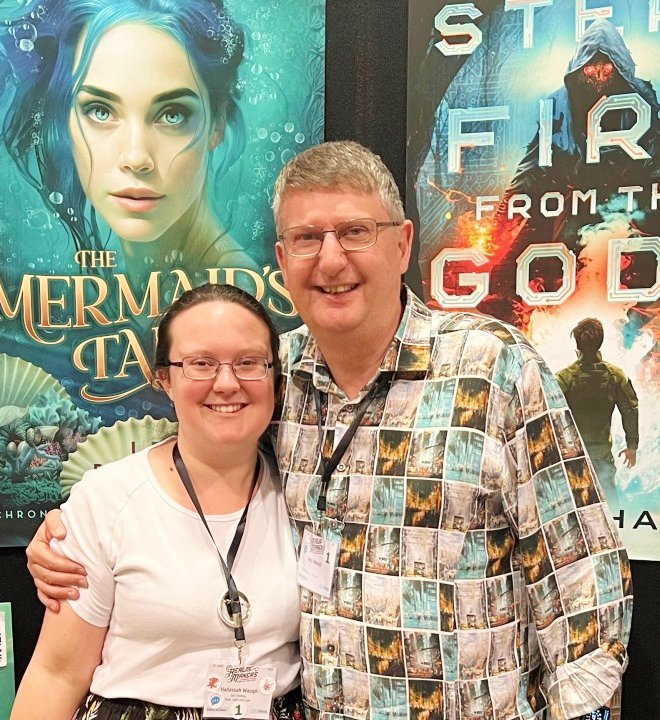

How do the methods and processes of the professional fictional writing world relate to writing Asset Management Plans?
In July, Ross took some time to accompany his daughter, Hadassah, to the Realm Makers writers conference in St Louis, Missouri. Ross Waugh was introduced to the publishing industry and some new writing techniques.
Reflecting on this fantasy fiction writers’ conference and his daughter’s writing training, Ross has considered how these techniques can be applied to Asset Management and, more specifically, to Asset Management Plan writing.
Ross also references the recent Āpōpō course, AM 201 – Telling the Story of Asset Management, in which he was part of the pilot team.
Ross writes:
What place does an Asset Manager have at a writers’ conference?
I naively thought that fiction writing involved an author writing a book and then getting it published. I have learnt from my recent conference attendance and observing Hadassah‘s learning journey as an author that the process and the industry are incredibly structured.
In writing fantasy fiction, there is consideration of consistent world-building, story arcs and character arcs that must all fit together well. The story must be compelling and engage the readers. The inciting incident (the reason for the story) must be very early in the book – some would say the first chapter, but certainly in the first few chapters.
There is a defined structure to a story that should be used. Once the story is drafted, there is the editing process – developmental edits, line edits, copy edits, proofreading, then typesetting and gallery proofs which may also be edited if errors are noted. Then publishing, marketing, distribution and sales.
Having been involved in the pilot team of Āpōpōs AM 201 – Telling the Story of Asset Management (thanks to Debra Bradley for leading this), I was able to note some of the cross-overs and similarities between the book writing and publishing process and some lessons we could apply to AMP writing. Some of these observations also derive from my involvement in reviewing hundreds of AMPs over the years.
Clearly describing the assets being managed, the authority managing them, and the legal requirements are analogous to the world-building in fiction writing. This needs to have consistently stated information throughout the plan, a cross-check of figures, charts, tables and information presented.
For AMPs, there is a need for consistent arcs of information throughout the plan – the impacts of levels of service, demand, risk analysis and lifecycle management through the plan and asset classes need to be consistent, analogous to the story and character arcs in fiction writing.
The reason and main drivers of investment should be stated early in the AMP, analogous to the inciting incident in fiction writing – the why this Plan is being written, the main reason for the Plan, and the main issues being addressed. Remember that Asset Management Plans are at their heart forward investment plans.
The AMP should engage the reader and tell the story well – see the AM 201 – Telling the Story of Asset Management digital badge for some good tips and techniques for this.
There are main characters and secondary characters in books. For AMPs, this would mean following the asset class values and not putting all your analysis and storytelling into low-value asset classes unless they carry a very high-risk profile. Follow the money (the driver of our main character) in terms of depth of analysis and information or storytelling.
The publishing industry editing process gave me a wry smile – it is highly structured, detailed, multi-level and multi-pass. The process takes time and significant effort.
How often with the production of AMPs do they get rushed to be finished at the last minute and out the door without thorough checks and edits. It shows. We can do much better as an asset management industry.
Having made these observations, can I suggest the AM 201 digital badge if you want to progress your own thinking in this area. Also Debra Bradley publishes a very worthwhile newsletter that often addresses the subject of good writing and storytelling within the technical writing domain.
ROSS WAUGH




